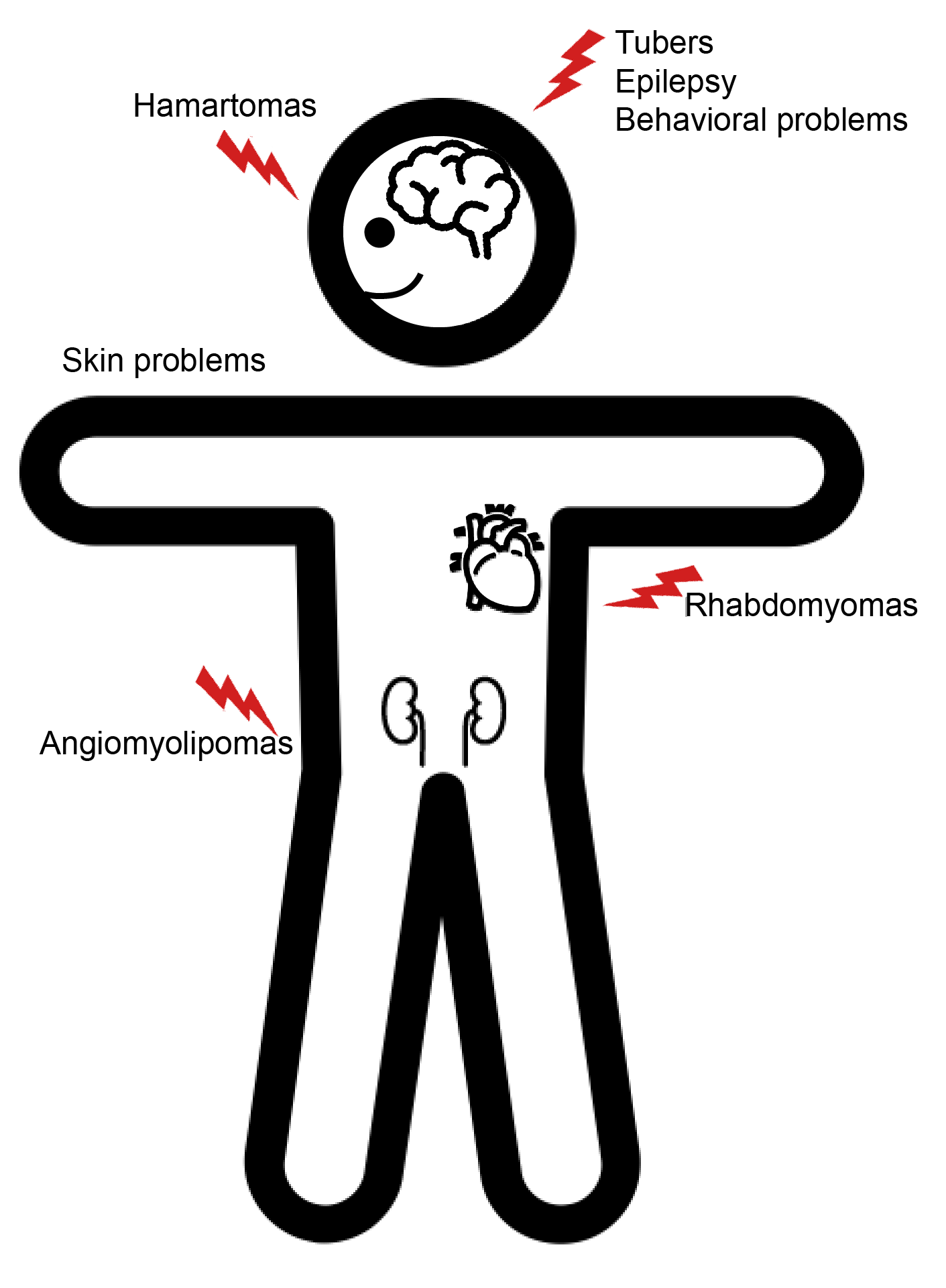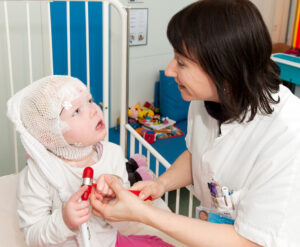What is TSC?
TSC is a condition that is very variable, which means that people with TSC get the symptoms listed below mild, severe or not. A characteristic of TSC is that benign tumors (called hamartomas) can develop in the body.

- Brain: Tubers, benign nodules, develop in brain development. As a result, 9 out of 10 children with TSC will develop epilepsy. There are also often learning difficulties. Some children are also diagnosed with autism. Many children with TSC have behavioral problems such as anxiety, mood problems or contact problems.
- Heart: Rhabdomyomas may be visible in the heart. These are sometimes already seen on the ultrasound during pregnancy. Sometimes infants suffer from this. Later in life they spontaneously shrink.
- Kidneys: Angiomyolipomas develop over the course of life.
- Skin: There are white spots on the skin and red bumps can grow on the face.
- Eyes: Retinal hamartomas can occur
What Causes TSC?
TSC is a genetic (genetic) condition. TSC arises when the TSC1 (hamartin) or TSC2 (tuberin) protein that the body makes is absent or does not work properly. These proteins form a complex that slows down the activity of the mTOR protein. The “recipe” for the production of the TSC proteins is stored in our genetic material, the DNA. The DNA contains the genetic code for our hereditary characteristics, the genes. The DNA is packed in chromosomes. In TSC, the error is in the TSC1 or TSC2 gene. The genetic defect can develop at the time of fertilization. There is then a small risk of recurrence. It is also possible that one of the parents is a carrier. There is then a recurrence risk of 50%. It is important to have this investigated.
How common is TSC?
TSC is a rare condition. It affects 1 in 6000 people.
Examination and diagnosis
People with TSC can develop various signs and symptoms. It is often better to detect symptoms before symptoms arise, so aggravation can be prevented. That is why regular checks at an expertise center are important. Different checks are important at different ages.
Infants
The diagnosis of TSC can be suspected because abnormalities can be seen on the ultrasounds during pregnancy or because one of the parents has TSC. Sometimes there is a suspicion of TSC after birth, for example because of a heart murmur, white patches on the skin or seizures. To make the diagnosis, a physical examination by a pediatrician, pediatric neurologist, ophthalmologist and pediatric cardiologist will be performed and the following additional examinations will be performed: DNA examination, MRI examination of the brain and an ultrasound of the kidneys and heart. Almost half of the children develop epilepsy in infancy. In the first 15 months of life, we keep a close eye on this with EEG studies, because early treatment is important for optimal brain development.
Children
 Children get a brain MRI every 2-3 years. Unless a child can lay motionless, we will do so under a light anesthetic. We also make an ultrasound of the kidneys every 1-2 years. If necessary, the pediatric cardiologist remains involved. One of the most important points of interest at this age is the development of learning ability (IQ), social-emotional development and behavior. All children are therefore tested by our regular neuropsychologist and child psychiatrist. Some of the children have autism. A large proportion of the children benefit from advice and sometimes medication from the child psychiatrist and child neuropsychologist. The intellectual development varies from normal to mentally impaired. Some of the children follow special education.
Children get a brain MRI every 2-3 years. Unless a child can lay motionless, we will do so under a light anesthetic. We also make an ultrasound of the kidneys every 1-2 years. If necessary, the pediatric cardiologist remains involved. One of the most important points of interest at this age is the development of learning ability (IQ), social-emotional development and behavior. All children are therefore tested by our regular neuropsychologist and child psychiatrist. Some of the children have autism. A large proportion of the children benefit from advice and sometimes medication from the child psychiatrist and child neuropsychologist. The intellectual development varies from normal to mentally impaired. Some of the children follow special education.
Adults
In adults, kidney checks are often the most important. When angiomyolipomas grow, treatment with mTOR inhibiting drugs is started. Epilepsy, behavioral problems, lung abnormalities or skin abnormalities can also be present in adulthood and attention is paid to this during the TSC consultation.
The TSC consultation hour
We follow children with TSC at the annual multidisciplinary TSC consultation. Children are measured by the assistant, weighed and blood pressure is measured. Then they come to the nurse specialist and the doctor. If necessary, an ultrasound of the kidneys or blood tests will be done on the same day. If an MRI of the brain is to be made, it is often necessary to do it under anesthesia. This takes place on the day treatment.
At fixed ages, children are examined by the neuropsychologist and child psychiatrist to guide learning and behavioral problems.
If necessary, children also come in between for a consultation with the pediatric neurologist or pediatrician, for example if this is necessary for epilepsy treatment.
Adults with TSC are followed during the consultation hours of the internist and AVG. In adults, an examination of the kidneys with CT or MRI is done.
Child care
Pediatric neurologist and coordinator: Dr. Marie-Claire de Wit
Verpleegkundig specialist: Martine Broekema
Pediatrician EAA: Drs. Karen de Heus
Child and Adolescent Psychiatrist: Dr. Leontine ten Hoopen
Adult care
Interne Geneeskunde: Dr. Laura de Graaff & Francesca Hoek
Click here to go to the contact form or mail yourself to: tubereuzesclerose@erasmusmc.nl
In order to provide the best possible care to patients with a rare condition, it is essential that global knowledge about the condition is gathered. Nationwide, centers of expertise have been set up to stimulate care for rare disorders and to gather knowledge. For the formal recognition of an expertise center by the Ministry of Health, an important condition is that the expertise center gathers, analyzes and shares knowledge through publications. These can be publications in scientific journals, but also treatment guidelines for health care professionals or information brochures for patients or caregivers. We optimize care and research within ENCORE through standardized follow-up and close collaboration between doctors and researchers. That way, we can ultimately develop better treatments for rare conditions. You may therefore be asked to participate in research. Participation in research is always on a voluntary basis. The data obtained is stored and analyzed in an anonymous form. All research has been approved in advance by an ethics review committee.
To learn more about Tuberous Sclerosis Complex research at ENCORE, click here
There is a patient organization for people with TSC, STSN, click here to go to the website.
